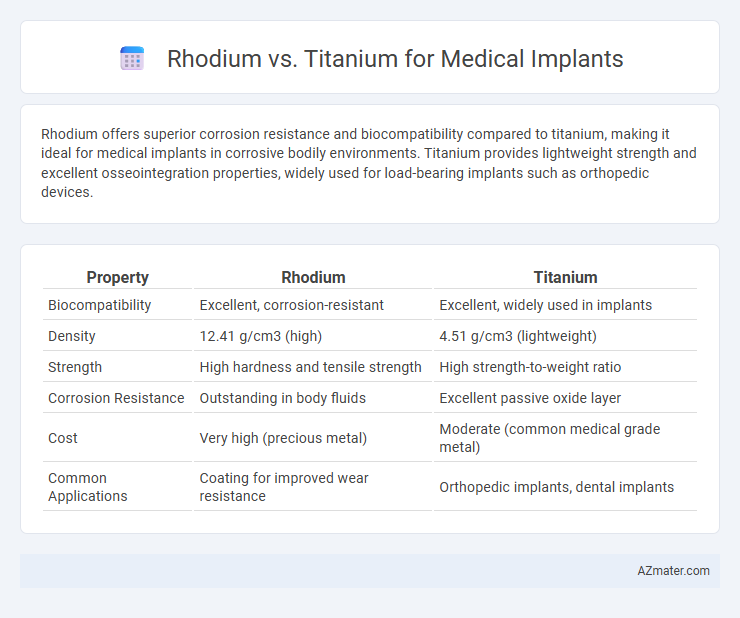Rhodium offers superior corrosion resistance and biocompatibility compared to titanium, making it ideal for medical implants in corrosive bodily environments. Titanium provides lightweight strength and excellent osseointegration properties, widely used for load-bearing implants such as orthopedic devices.
Table of Comparison
| Property | Rhodium | Titanium |
|---|---|---|
| Biocompatibility | Excellent, corrosion-resistant | Excellent, widely used in implants |
| Density | 12.41 g/cm3 (high) | 4.51 g/cm3 (lightweight) |
| Strength | High hardness and tensile strength | High strength-to-weight ratio |
| Corrosion Resistance | Outstanding in body fluids | Excellent passive oxide layer |
| Cost | Very high (precious metal) | Moderate (common medical grade metal) |
| Common Applications | Coating for improved wear resistance | Orthopedic implants, dental implants |
Introduction to Rhodium and Titanium in Medical Implants
Rhodium and titanium are key metals used in medical implants due to their exceptional biocompatibility and corrosion resistance. Titanium is widely favored for orthopedic and dental implants because of its high strength-to-weight ratio, excellent osseointegration, and lightweight nature. Rhodium, often utilized as a coating element, enhances implant durability and wear resistance by providing a hard, non-reactive surface that reduces metal ion release in the body.
Biocompatibility: Rhodium vs Titanium
Titanium exhibits exceptional biocompatibility, making it a preferred material for medical implants due to its ability to integrate well with bone and resist corrosion within the human body. Rhodium, while highly resistant to corrosion and often used as a plating material, has limited data on long-term biocompatibility when used as a bulk implant material. Titanium's established success in orthopedic and dental implants is attributed to its non-toxic nature and bioinert surface, promoting osseointegration and minimizing adverse reactions.
Mechanical Strength and Durability Comparison
Rhodium and titanium differ significantly in mechanical strength and durability for medical implants, with titanium exhibiting superior tensile strength up to 1,200 MPa and excellent corrosion resistance in bodily fluids, making it the preferred choice for load-bearing implants. Rhodium, while highly corrosion-resistant and biocompatible, has lower mechanical strength and is primarily used as a plating material rather than a structural implant material. The durability of titanium alloys such as Ti-6Al-4V ensures long-term performance under cyclic stress, essential for orthopedic and dental implants.
Corrosion Resistance: Which Metal Performs Better?
Rhodium exhibits superior corrosion resistance compared to titanium, making it highly effective in preventing oxidation and degradation within the human body. Titanium is widely valued for its biocompatibility and corrosion resistance, but it can form a passive oxide layer that may degrade under certain physiological conditions. The noble metal properties of rhodium offer unmatched chemical stability, ensuring minimal metal ion release and long-term implant durability.
Allergic Reactions and Patient Safety
Rhodium exhibits excellent biocompatibility with minimal allergenic potential, reducing the risk of hypersensitivity in patients with metal allergies, while titanium is widely recognized for its low allergenic profile and high corrosion resistance, making it ideal for medical implants. Titanium's oxide layer prevents metal ion release, ensuring patient safety and reducing inflammatory responses commonly linked to allergic reactions. Studies indicate titanium implants outperform rhodium in long-term tissue integration and immune tolerance, emphasizing titanium as the preferred material for minimizing allergic complications in medical applications.
Cost Analysis: Rhodium vs Titanium Implants
Rhodium implants typically incur higher costs due to the metal's rarity and complex refining processes, often making them less economically feasible compared to titanium. Titanium's widespread availability, biocompatibility, and ease of manufacturing contribute to its cost-effectiveness in medical implant applications. Cost analysis reveals titanium as the preferred choice for medical implants, balancing performance and affordability without compromising patient safety.
Imaging Compatibility: MRI and X-Ray Considerations
Rhodium offers superior MRI compatibility due to its non-ferromagnetic properties, minimizing image artifacts and improving diagnostic clarity. Titanium, widely used in medical implants, provides strong biocompatibility but can generate mild MRI artifacts and slight distortions in X-ray imaging. Both metals are radiopaque, but titanium's density creates more pronounced X-ray shadows compared to rhodium, influencing image interpretation during post-operative assessments.
Applications in Specific Medical Implants
Rhodium, known for its exceptional corrosion resistance and biocompatibility, is primarily used in coating and surface treatments for cardiovascular stents and dental implants to enhance durability and reduce allergic reactions. Titanium, widely favored for orthopedic implants such as hip and knee replacements, offers a superior strength-to-weight ratio and excellent osseointegration properties, promoting faster bone healing and long-term implant stability. Both materials play critical roles in medical applications by addressing specific requirements: rhodium excels in surface protection for delicate medical devices, while titanium delivers structural support in load-bearing implants.
Longevity and Performance in Clinical Studies
Rhodium and titanium are both used in medical implants, with titanium widely favored for its exceptional biocompatibility, corrosion resistance, and long-term durability demonstrated in numerous clinical studies. Rhodium, while highly resistant to oxidation and wear, is less commonly applied in implants due to limited long-term clinical data but shows promise in enhancing surface hardness and reducing allergic reactions when used as a coating. Comparative research highlights titanium's proven ability to maintain structural integrity and functionality over decades, whereas rhodium's role remains specialized, primarily improving the performance of titanium-based devices.
Future Trends in Implant Materials: Rhodium or Titanium?
Titanium remains the gold standard for medical implants due to its excellent biocompatibility, corrosion resistance, and mechanical strength, supporting the longevity and integration of implants. Emerging research on rhodium highlights its superior corrosion resistance and potential for enhanced biocompatibility, making it a promising candidate for future implant coatings and specialized applications. Advances in nanotechnology and surface modification are driving the exploration of rhodium-titanium composites to combine the strengths of both metals, aiming to improve implant durability and patient outcomes.

Infographic: Rhodium vs Titanium for Medical Implant
 azmater.com
azmater.com